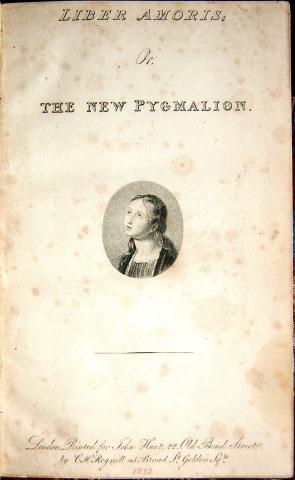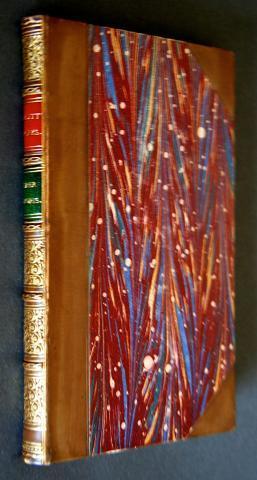www.gauntantik.com
[HAZLITT, William]
Liber Amoris; Or, The New Pygmalion.
London: for John Hunt, 1823
First edition. Duodecimo, 17.2 x 11.2 cm overall, the pages 16.8 x 10.5 cm. 3 ll. plus 192 pages, collating [A]3, B12-I12: [2ll.] (binder’s endleaf and blank), 1 l. (title with engraved vignette recto), 1 l. (Advertisement), 1 l. (fly-title Liber Amoris recto), pp. [1]-[45] (Liber Amoris), [46]-124 (Liber Amoris Part II), [125]-192 (Liber Amoris Part III), [2ll.] (binder’s endleaf and blank), complete. Printed on thin cream wove paper with “1821” watermark. 19th-century (later?) 1/2 brown calf over maroon, blue, orange and grey-white Antique Spot marbled paper, spine in six compartments with gilt tooled raised bands, red morocco author label and green morocco title label in second and third compartments, gilt vine and leaf tooling in other panels, top edges gilt, others cut, conforming marbled paper endleaves. Armorial bookplate of Ogden Goelet (1851-1897) on front pastedown. Very good overall, slight cover edgewear and spine wear, endpapers split in front gutter, moderate foxing and light toning throughout. Keynes 67.
Opening with “The Picture,” Hazlitt, consummate critic-essayist conversant with Haydon and the Lambs, self-deludes into fevered infatuation, descends into self-tormenting madness. On the utter brink of perishing, he finishes the ordeal, “discordant to human ears,” as suddenly as he plunges into it. Cauterizing the wound with still self-piteous detachment, he exclaims (To J.S.K-, p. 192) , “Her image seems fast ‘going into the wastes of time,’ like a weed that the wave bears farther and farther from me. Alas! thou poor hapless weed, when I entirely lose sight of thee, and forever, no flower will ever bloom on earth to glad my heart again!” Hazlitt's thinly-veiled recounting of consuming obsession courted his near-destruction by his Tory enemies at Blackwood’s Magazine, but the reviewer in Hunt’s Examiner riposted (May 11, 1823), “At all events, 'Liber Amoris' is a novelty in the English language, and we doubt not will be received as a rara avis in this land of phlegm and sea-coal.” And so today, “Why’s this so good?” No. 69, Jack El-Hai in the Nieman Storyboard: “Even so, who can argue with a man who wants only peace, serenity, a glimpse of beauty, and love? These desires are universal. That’s how Hazlitt gets his narrator on our good side. At other times, he makes the narrator disgust us with his clumsy seductive moves, and they are nothing more than that. That’s Hazlitt’s game in Liber Amoris: make us like the guy, make us recoil from him, and demonstrate that in telling a partly nonfiction tale (or at least a story largely autobiographical) he can thoroughly bewilder us.”
Provenance: Armorial bookplate of Ogden Goelet (1851-1897) on front pastedown.

